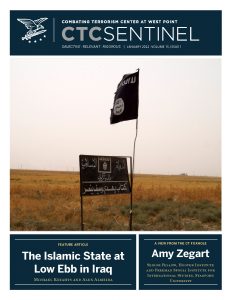From the Editor
Notwithstanding a night attack that killed 11 Iraqi soldiers on an army base in the Iraqi province of Diyala earlier this month, the Islamic State is at its lowest ebb in Iraq in many years, according to new data published by Michael Knights and Alex Almeida in this month’s feature article. They write that “a comprehensive analysis of attack metrics shows an insurgency that has deteriorated in both the quality of its operations and overall volume of attack activity, which has fallen to its lowest point since 2003. The Islamic State is increasingly isolated from the population, confined to remote rural backwaters controlled by Iraq’s less effective armed forces and militias, and lacks reach into urban centers.” They note that “the key analytical quandary that emerges from this picture is whether the downtrend marks the onset of an enduring decline for the group, or if the Islamic State is merely lying low while laying the groundwork for its survival as a generational insurgency.”
In this month’s interview, Amy Zegart speaks to Brian Fishman and Don Rassler about her soon-to-be published book Spies, Lies, and Algorithms: The History and Future of American Intelligence. In the interview, she calls for the creation in the United States of a dedicated open-source intelligence agency because “OSINT will never get the priority or resources the nation needs without its own agency.”
Amira Jadoon, Abdul Sayed, and Andrew Mines assess the threat trajectory of Islamic State Khorasan (ISK) in the wake of the Taliban takeover of Afghanistan. They assess that “given the absence of multilateral counterterrorism pressure, the Taliban’s limited capacity to govern, and a worsening humanitarian crisis in Afghanistan, ISK now finds itself perhaps in the most permissive environment yet to rebuild, rally, and expand.” Drawing on extensive fieldwork, including interviews with bandits and jihadi defectors, James Barnett, Murtala Ahmed Rufa’i, and Abdulaziz Abdulaziz examine the nexus between Nigeria’s bandits and jihadi organizations in northwestern Nigeria. They find that despite widespread fears bandits and jihadis would find common cause, there has been infrequent cooperation between them because they have conflicting approaches in their treatment of local inhabitants and because the more powerful bandits feel they have little to gain from working with the jihadis.
Paul Cruickshank, Editor in Chief
 Skip to content
Skip to content

